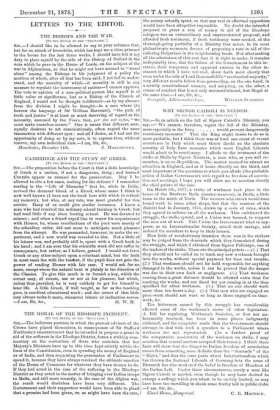CAMBRIDGE AND THE STUDY OF GREEK.
(To THE EDITOR OF THE "SPECTATOR.') SIR,—The proposition before the Court is that a little knowledge of Greek is a useless, if not a dangerous, thing ; and learned Cantabs appear as counsel for the prosecution. May I be allowed to cite a few cases, making for the defence ? I remember reading in the "Life of Macaulay " that he, while in India, revived the dormant Greek of a friend, whose name 1 think is now well known (I have not the book here with which to refresh my memory), but who, at any rate, was most grateful for this service. Many of us could give similar instances. I know a man who had received the ordinary school training in Greek, but had read little if any since leaving school. He was devoted to science ; and when a friend urged him to renew his acquaintance with Homer, he, whose recollections of the poet were merely of the schoolboy order, did not seem to anticipate much pleasure from the attempt. He was persuaded, however, to make the ex- periment, and a new world was revealed to him. Not a little of his leisure was, and probably still is, spent with a Greek book in his hand ; and I am sure that his scientific work did not suffer in consequence, but rather, as I believe, gained. I would not force Greek or any other subject upon a reluctant mind, but the fault in most cases lies with the teacher, if the pupil does not gain the power of reading Homer with fair ease. I would ask for no more, except where the natural bent is plainly in the direction of the Classics. To give this much is to furnish a key, which the owner may, of course, use or not at his pleasure, bat which, unless thus provided, he is very unlikely to get for himself in later life. A little Greek, if well taught, as far as the teaching goes, is excellent educational work ; and the owner of that little may always make it more, whenever leisure or inclination serves.






































 Previous page
Previous page